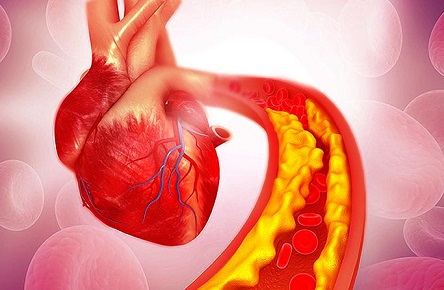American study warns that COVID-19 is triggering the onset and progression of Atherosclerosis in many!
Nikhil Prasad Fact checked by:Thailand Medical News Team Aug 09, 2024 1 year, 5 months, 3 weeks, 5 days, 11 hours, 1 minute ago
COVID-19 News: The COVID-19 pandemic has left a significant impact on global health, and recent findings suggest a concerning link between COVID-19 and the development of atherosclerosis - a condition where the arteries become clogged with fatty substances, potentially leading to heart attacks and strokes.
 American study warns that COVID-19 is triggering the onset and progression of
American study warns that COVID-19 is triggering the onset and progression of
Atherosclerosis in many
Researchers from multiple esteemed American institutions, including the University of Arkansas for Medical Sciences, Johns Hopkins School of Medicine, and Cedars-Sinai Medical Center, have highlighted the alarming trend of COVID-19 triggering and accelerating atherosclerosis in many patients.
A Hidden Threat Emerging from the Pandemic
While the world focused on the respiratory impacts of COVID-19, this article sheds light on the virus’s insidious effects on the cardiovascular system. Atherosclerosis, a condition traditionally associated with risk factors like high cholesterol, smoking, and diabetes, is now being observed in individuals who have recovered from COVID-19. This is particularly concerning as atherosclerosis can lead to life-threatening conditions such as heart attacks and strokes.
The research team has pointed out that COVID-19 is not just a respiratory illness but a vascular one that deeply affects the blood vessels. The
COVID-19 News report explores the various ways in which COVID-19 interacts with the cardiovascular system, leading to the initiation and progression of atherosclerosis as detailed in the study. This is not just about those who had severe COVID-19 as even those with mild or moderate symptoms or were even asymptomatic during acute infection phase, are at risk.
How COVID-19 Triggers Atherosclerosis
COVID-19 impacts the body in several ways that can lead to atherosclerosis. The virus is known to cause endothelial dysfunction, where the inner lining of the blood vessels becomes damaged. This damage sets off a cascade of events, including inflammation and the activation of platelets, which are small blood cells that help with clotting.
Endothelial dysfunction is a critical early event in the development of atherosclerosis. In patients recovering from COVID-19, endothelial cells (the cells lining the blood vessels) become more susceptible to damage due to the prolonged inflammatory response triggered by the virus. This inflammation doesn’t just go away once the patient recovers from the acute phase of COVID-19. Instead, it lingers, causing continuous damage to the blood vessels.
The study also highlights how the virus can exacerbate the body's immune response, leading to a condition known as a cytokine storm. This overreaction by the immune system causes severe inflammation, further damaging the blood vessels and accelerating the formation of atherosclerotic plaques.
The Role of Platelets and Immune Cells
Another significant finding is the role of p
latelets and immune cells in this process. Platelets, which are essential for blood clotting, become hyperactivated during COVID-19. This hyperactivation can lead to the formation of blood clots, which are a hallmark of severe COVID-19. Moreover, these activated platelets interact with immune cells, further promoting inflammation and contributing to the progression of atherosclerosis.
The researchers explain that this interaction between platelets and immune cells creates a vicious cycle. The immune system, already on high alert due to the viral infection, releases various substances that cause more platelets to become activated. These activated platelets, in turn, stimulate more immune cells, leading to more inflammation and more damage to the blood vessels.
Long-Term Cardiovascular Risks
One of the most concerning aspects of this research is the long-term cardiovascular risks posed by COVID-19. Even after recovering from the virus, patients may continue to experience the effects of atherosclerosis, which could lead to cardiovascular events like heart attacks and strokes months or even years down the line.
The study points out that this is particularly troubling for patients with pre-existing cardiovascular conditions. For these individuals, COVID-19 could act as a catalyst, rapidly accelerating the progression of atherosclerosis. However, even those without prior cardiovascular issues are not safe, as the virus can initiate atherosclerosis in previously healthy individuals.
What This Means for the Future
Given these findings, the researchers emphasize the need for long-term monitoring of COVID-19 survivors, especially those with risk factors for cardiovascular disease. The medical community needs to be aware of this potential consequence of COVID-19 and should consider screening for atherosclerosis in patients who have recovered from the virus.
Furthermore, there is a call for more research into potential treatments that could mitigate these effects. Some therapies currently used for cardiovascular diseases, such as anti-inflammatory drugs, may be beneficial in managing the long-term impacts of COVID-19 on the heart and blood vessels.
Conclusion
In conclusion, the research underscores the importance of understanding COVID-19 not just as a respiratory illness but as a condition with far-reaching effects on the cardiovascular system. This revelation that COVID-19 can trigger and accelerate atherosclerosis in many patients is a sobering reminder of the long-term consequences of the pandemic. As we continue to navigate through this global health crisis, it is crucial to remain vigilant about the hidden dangers that may arise even after recovery.
The study findings were published in the peer-reviewed journal JACC: Advances.
https://www.sciencedirect.com/science/article/pii/S2772963X24003016
For the latest
COVID-19 News, keep on logging into Thailand Medical News.
Read Also:
https://www.thailandmedical.news/news/geniposide-a-promising-treatment-for-covid-19-and-atherosclerosis-patients
https://www.thailandmedical.news/news/herbs-and-phytochemicals-corilagin-from-hypophyllum-eliminates-macrophages-inflammation-in-atherosclerosis-through-tlr4-nf%CE%BAb-mapk-pathway
